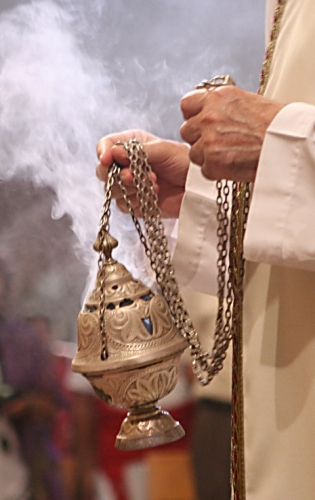 "We are the good odor of Christ." - 2 Corinthians 2:15
"We are the good odor of Christ." - 2 Corinthians 2:15 "We are the good odor of Christ." - 2 Corinthians 2:15
"We are the good odor of Christ." - 2 Corinthians 2:15
Saint Paul speaks of himself and of his disciple Titus, but his words apply to all those who are called to share in the same work, and who pursue it in the same spirit. The true priest is at all times " the good odor of Christ."
Sweet-smelling substances are grateful to all. Orientals in particular have shown a special love for them at all times. "Ointments and perfumes rejoice the heart" says the sage (Proverbs 27:9). Isaac in haled with pleasure the fragrance of Jacob's garment as the latter approached to receive his blessing (Genesis 27:27). God Himself is spoken of (Genesis 8:21) as welcoming the sweet savor of the holocaust offered by Noah, and right through the Levitical law the burnt offerings are referred to as "holocausts of sweet odor." The Canticle of Canticles is, so to speak, all laden with perfumes; and Wisdom (Eccl. 24:20,21) represents herself as enriched with aromas of the most varied kinds. Perfumes were part of the gifts offered to Our Lord by the wise men at the beginning of His mortal life, and by Mary Magdalen toward its close. The chief value of the ointment she poured out on the feet of her Lord was its fragrance, which, Saint John tells us, filled the whole house. (John 12:3)
This helps us to understand the higher and broader sense of the expression as applied to Our Lord Himself. He is the source of the mysterious fragrance which fills the souls of His children, and which is a participation of His spirit and of His very life. The priest is the medium by which it reaches them. But, just as material objects, in order to transmit an odor, have first to become impregnated by close and continuous contact with the source from which it emanates, so the priest, in order to spread the divine fragrance of Christ around him, has to live in close contact with his Master, has to become familiar with His teachings, to imbibe His spirit, -in a word, to share more abundantly in His life. Without that, he may be active, intelligent, eloquent; yet he will not carry with him the "good odor of Christ." If, on the contrary, he daily imbibes that spirit, if he fills his thoughts with the Gospel, if, according to the counsel of Saint Paul (Phil. ii. 5), he " has that mind in him which was also in Christ Jesus" then indeed he may go forth and mingle with his fellow men, for everywhere he will bring with him the Saviour's heavenly fragrance.
Its presence in him is not slow to reveal itself. Just as a sweet odor goes forth of itself from a body saturated with it and in a way to be noticed by all, so the spirit of Christ goes forth from a true priest and pervades the atmosphere that surrounds him - a spirit of piety, of faith, of humility, of love - and nobody can approach without in some measure enjoying it. Of Our Saviour it is said that " all the multitude sought to touch Him, for virtue went out from Him and healed all."- Luke vi. 19. So is it with the pious priest; a virtue is ever going forth from him, and healing a number of moral infirmities around him. And even when he is gone, something of his sweet spirit lingers behind, revealing his passage; and people will sometimes say, as the disciples of Emmaus said of Our Lord after He had dis appeared from before their eyes: "Was not our heart burning within us whilst he spoke in the way!" - Luke 24:32
Thus is the holy priest the good odor of Christ. But what is the tepid, the careless, the worldly priest? What does he bring with him when he mingles with his fellow men, and what does he leave behind him?
Must we answer with the prophet Isaiah: "erit pro suavi odore faetor?"
"Ea debet esse vita et conversatio sacerdotis, ut omnes motus et gressus, atque universa ejus opera coelestem redoleant gratiam." - S. Hieron
- from Daily Thoughts for Priests, by Father John Baptist Hogan, S.S., D,D., 1899; it has the Imprimatur of Archbishop John Joseph Williams, Archdiocese of Boston, Massachusetts